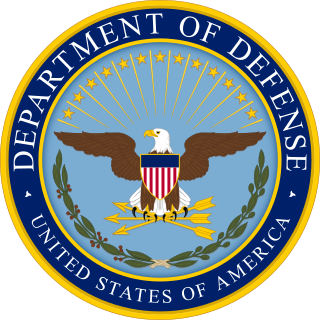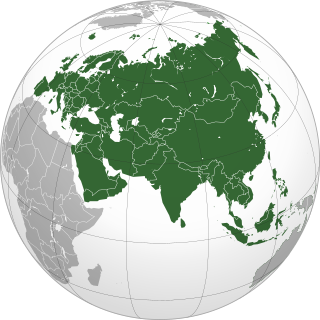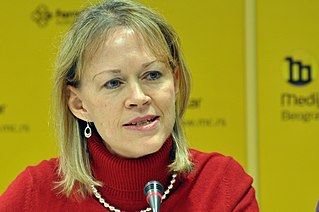
The Bureau of Intelligence and Research (INR) is an intelligence agency in the United States Department of State. Its central mission is to provide all-source intelligence and analysis in support of U.S. diplomacy and foreign policy. INR is the oldest civilian element of the U.S. Intelligence Community and among the smallest, with roughly 300 personnel. Though lacking the resources and technology of other U.S. intelligence agencies, it is "one of the most highly regarded" for the quality of its work.
The Eurasian Economic Community was a regional organisation between 2000 and 2014 which aimed for the economic integration of its member states. The organisation originated from the Commonwealth of Independent States (CIS) on 29 March 1996, with the treaty on the establishment of the Eurasian Economic Community signed on 10 October 2000 in Kazakhstan's capital Astana by Presidents Alexander Lukashenko of Belarus, Nursultan Nazarbayev of Kazakhstan, Askar Akayev of Kyrgyzstan, Vladimir Putin of Russia, and Emomali Rahmon of Tajikistan. Uzbekistan joined the community on 7 October 2005, but later withdrew on 16 October 2008.

In the United States government, the Bureau of African Affairs (AF) is part of the U.S. Department of State and is charged with advising the Secretary of State on matters of Sub-Saharan Africa. The bureau was established in 1958. It is headed by the Assistant Secretary of State for African Affairs who reports to the Under Secretary of State for Political Affairs. Molly Phee is the current Assistant Secretary.

The Bureau of Legislative Affairs, also known as the "H Bureau", is the office of the United States Department of State that coordinates legislative activity for the Department of State and advises the Secretary, the Deputy, as well as the under secretaries and assistant secretaries on legislative strategy. The bureau facilitates communication between State Department officials and the Members of Congress and their staffs. The bureau works closely with authorizing, appropriations, and oversight committees of the House and Senate, as well as with individual members that have an interest in State Department or foreign policy issues. The bureau manages department testimony before House and Senate hearings, organizes member and staff briefings, and facilitates Congressional travel to overseas posts for members and staff throughout the year. The bureau reviews proposed legislation and coordinates Statements of Administration Policy on legislation affecting the conduct of U.S. foreign policy. The bureau staff advises individual bureaus of the department on legislative and outreach strategies and coordinates those strategies with the secretary's priorities.

The United States under secretary of defense for policy (USDP) is a high level civilian official in the United States Department of Defense. The under secretary of defense for policy is the principal staff assistant and adviser to both the secretary of defense and the deputy secretary of defense for all matters concerning the formation of national security and defense policy.

In the United States Government, the Bureau of East Asian and Pacific Affairs is part of the United States Department of State and is charged with advising the Secretary of State and Under Secretary of State for Political Affairs on matters of the Asia-Pacific region, as well as dealing with U.S. foreign policy and U.S. relations with countries in the region. It is headed by the Assistant Secretary of State for East Asian and Pacific Affairs, who reports to the Under Secretary of State for Political Affairs.

In the United States government, the Bureau of Western Hemisphere Affairs (WHA) is a part of the U.S. Department of State, charged with implementing U.S. foreign policy and promoting U.S. interests in the Western Hemisphere, as well as advising the Under Secretary of State for Political Affairs. It is headed by the Assistant Secretary of State for Western Hemisphere Affairs, who is currently Brian A. Nichols.

The Bureau of South and Central Asian Affairs (SCA) is an agency within the United States Department of State that is responsible for the U.S. government's relations with countries in the South and Central Asian region. The bureau is headed by the Assistant Secretary of State for South and Central Asian Affairs, who reports to the Secretary of State through the Under Secretary of State for Political Affairs. The current Assistant Secretary is Donald Lu, incumbent since September 15, 2021.

The Bureau of Near Eastern Affairs (NEA), also known as the Bureau of Near East Asian Affairs, is an agency of the Department of State within the United States government that deals with U.S. foreign policy and diplomatic relations with the nations of the Near East. It is headed by the Assistant Secretary of State for Near Eastern Affairs, who reports to the Under Secretary of State for Political Affairs.

The Bureau of Democracy, Human Rights and Labor Affairs (DRL) is a bureau within the United States Department of State. The bureau is under the purview of the Under Secretary of State for Civilian Security, Democracy, and Human Rights.

Matthew James Bryza is a former United States diplomat. His last post in the United States foreign service was the United States Ambassador to Azerbaijan.

Carey Edward Cavanaugh is a former U.S. Ambassador/peace mediator and chairman of International Alert, a London-based independent peacebuilding organization. He is currently professor of diplomacy at the University of Kentucky.

Richard Eugene Hoagland is a career ambassador in the United States Department of State. He was Principal Deputy Assistant Secretary in State's Bureau of South and Central Asian Affairs from 2013-2015. In the summer of 2016, based at the U.S. Embassy in Amman, Jordan, he was the senior U.S. liaison to the Russian Reconciliation Center at the Russian military base in Latakia, Syria. In 2017 he served as interim U.S. co-chair of the OSCE Minsk Group, the group appointed by the Organization for Security and Cooperation in Europe to coordinate international peace-making efforts on the conflict in Nagorno-Karabakh.

Eurasia is the largest continental area on Earth, comprising all of Europe and Asia. According to some geographers, physiographically, Eurasia is a single continent. The concepts of Europe and Asia as distinct continents date back to antiquity, but their borders have historically been subject to change, for example to the ancient Greeks Asia originally included Africa but they classified Europe as separate land. Eurasia is connected to Africa at the Suez Canal, and the two are sometimes combined to describe the largest contiguous landmass on Earth, Afro-Eurasia.

The Center for Strategic Studies under the president of the Republic of Azerbaijan (SAM) is Azerbaijan’s first governmental, non-profit think tank founded on November 12, 2007, by the decree of the president, Ilham Aliyev. Its headquarters is in Baku, Azerbaijan. In February 2008, by the decree of the president of the Republic of Azerbaijan, Elkhan Nuriyev was appointed director of the Center for Strategic Studies, known by the acronym SAM in Azerbaijani language.

Earl Anthony Wayne is an American diplomat. Formerly Assistant Secretary of State for Economic and Business Affairs, Ambassador to Argentina and Deputy Ambassador to Afghanistan, Wayne served nearly four years as Ambassador to Mexico. He was nominated by President Obama and confirmed by the Senate in August, 2011. He departed Mexico City for Washington July 31, 2015 and retired from the State Department on September 30, 2015. Wayne attained the highest rank in the U.S. diplomatic service: Career Ambassador. He is currently a Professorial Lecturer and Distinguished Diplomat in Residence at American University's School of International Service where he teaches courses related to diplomacy and US foreign policy. Wayne also works with the Woodrow Wilson International Center for Scholars, the Atlantic Council, the Center for Strategic and International Studies,. Wayne is co-chair of the Mexico Institute's Advisory Board at the Wilson Center. He is also on the board of the American Academy of Diplomacy and the Public Diplomacy Council of America. Wayne is an independent consultant, speaker and writer and works with several not-for-profit professional associations. He was an adviser for HSBC Latin America on improving management of financial crime risk from 2015 until 2019 and served on the board of the American Foreign Service Association from 2017 to 2019.

Vinokurov, Evgeny is a Russian economist, currently serving as the Chief Economist at Eurasian Development Bank. His research is in macro- and microeconomics, regional integration, global financial and economic architecture and international organizations.

Mary Burce Warlick is an Australian-born, American diplomat who was appointed Deputy Executive Director of the International Energy Agency in May 2021. A former United States career diplomat, she served as the United States Ambassador to Serbia from January 2010 to September 2012, as the U.S. Consul General in Melbourne, Australia from October 2012 to July 2014, as Principal Deputy Assistant Secretary in the Bureau of Energy Resources at the Department of State from August 2014 to September 2017, and as Acting Special Envoy and Coordinator for International Energy Affairs from January to September 2017.

The Bureau of Energy Resources (ENR) is a bureau in the United States Department of State that coordinates the department's efforts in promoting international energy security. Under the purview of the Under Secretary of State for Economic Growth, Energy, and the Environment. the Bureau of Energy Resources' current head is Assistant Secretary Geoffrey R. Pyatt.

Aaron Wess Mitchell is an American foreign policy expert and former diplomat who was the Assistant Secretary of State for European and Eurasian Affairs from October 2017 until February 2019. Prior to assuming the role at State Department, he was president and CEO of the Center for European Policy Analysis. On July 19, 2017, President Donald Trump nominated Mitchell as Assistant Secretary of State for European and Eurasian Affairs.














